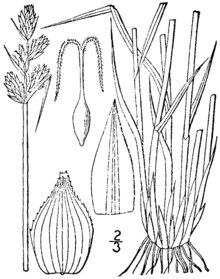Carex adusta
Carex adusta, commonly known as the lesser brown sedge[1] or the browned sedge,[2] is a species of sedge (Carex) in the section Ovales. First described scientifically in 1839 by Francis Boott, it is found in Canada and the northeastern United States, where it grows in dry, acidic, sandy soils.[3][4] Adusta is Latin for "burnt," probably referring to the color.
| Carex adusta | |
|---|---|
 | |
| Scientific classification | |
| Kingdom: | Plantae |
| Clade: | Tracheophytes |
| Clade: | Angiosperms |
| Clade: | Monocots |
| Clade: | Commelinids |
| Order: | Poales |
| Family: | Cyperaceae |
| Genus: | Carex |
| Subgenus: | Carex subg. Vignea |
| Section: | Carex sect. Ovales |
| Species: | C. adusta |
| Binomial name | |
| Carex adusta | |
Description
The plants have densely clustered culms that grow 2.5–8 cm (1.0–3.1 in) high, and leaves measuring 7–25 cm (2.8–9.8 in) long by 2–3.5 mm wide.[2]
gollark: I want simple/lightweight and ideally not written in PHP.
gollark: Er, for.
gollark: I'll look at good wiki software then.
gollark: I can put NDing information on it to annoy TJ09 *more*!
gollark: That was a stupid rule.
References
- Johnson T. (1998). CRC Ethnobotany Desk Reference. CRC Press. p. 151. ISBN 978-0-8493-1187-1.
- Leighton AL. (2012). Sedges (Carex) of Saskatchewan. Flora of Saskatchewan. Fascicle 3. Regina, Canada: Nature Saskatchewan. p. 60. ISBN 978-0-921104-29-2.
- "Carex adusta". County-level distribution map from the North American Plant Atlas (NAPA). Biota of North America Program (BONAP). 2014. Retrieved 15 April 2019.
- "Carex adusta Boott in W. J. Hooker". Flora of North America. www.eFloas.org. Retrieved 2014-12-19.
This article is issued from Wikipedia. The text is licensed under Creative Commons - Attribution - Sharealike. Additional terms may apply for the media files.